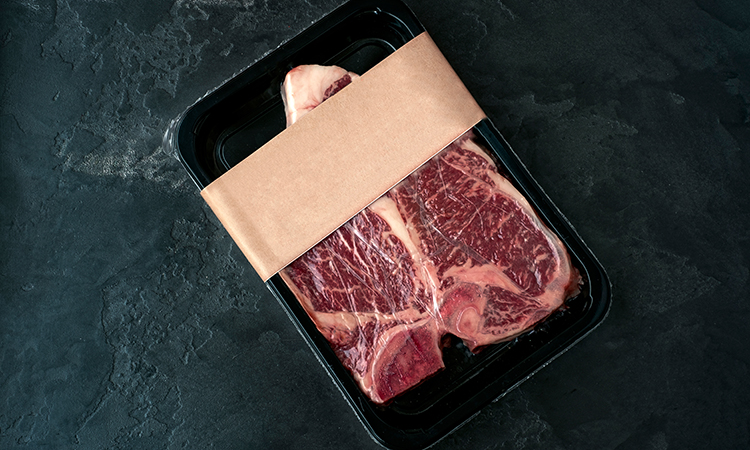FSA revises vacuum packed meat shelf-life
- Like
- Digg
- Del
- Tumblr
- VKontakte
- Buffer
- Love This
- Odnoklassniki
- Meneame
- Blogger
- Amazon
- Yahoo Mail
- Gmail
- AOL
- Newsvine
- HackerNews
- Evernote
- MySpace
- Mail.ru
- Viadeo
- Line
- Comments
- Yummly
- SMS
- Viber
- Telegram
- Subscribe
- Skype
- Facebook Messenger
- Kakao
- LiveJournal
- Yammer
- Edgar
- Fintel
- Mix
- Instapaper
- Copy Link
Posted: 10 December 2020 | Joshua Minchin (New Food) | No comments yet
The move to extend VP/MAP shelf life will not compromise food safety, states the FSA, and will mean less meat is thrown away in the UK.


Shelf-life guidance for vacuum and modified atmosphere packed (VP/MAP) chilled fresh beef, lamb and pork has been updated by the Food Standards Agency (FSA), with businesses now able to apply a shelf life of 13 days to the above products.
From now on, the FSA says food business operators (FBOs) can choose a safe shelf-life for these specific products in line with their existing food safety management systems, in the same way they already do for other types of food. Moving away from a ‘one size fits all’ approach will, according to the agency, benefit both consumers and industry.
It is hoped that by extending the shelf life of vacuum-packed meat, high food safety standards will continue to be upheld, while some of the £3 billion worth of food that the UK throws away every year is reduced.
The FSA says the decision has been taken based on a combination of evidence that includes expert microbiological advice, epidemiological information on the occurrence of botulism, and international data over many years on meat products. If implemented correctly, these new guidelines should have no negative impact on food safety.
Last month, a public consultation into options to change the previous 10-day maximum shelf-life best practice guidance for these products concluded.
“We can announce that our best practice guidance on the safety and shelf-life of VP/MAP chilled beef, lamb and pork is changing,” said Rebecca Sudworth, FSA Director of Policy.
“The UK has a robust legal framework and the food industry is responsible for ensuring food placed on the market is safe. Food businesses will be able to follow existing industry guidance to ensure that an appropriate shelf-life is applied to these products, while support will be provided to smaller businesses who may not have this capability by setting a modified 13-day limit.
“We are confident that food businesses throughout the UK will continue to put standards and safety at the heart of everything they do, so consumers can be confident their interests come first.”
David Lindars, who is co-chair of the working group and Technical Operations Director of the British Meat Processors Association, has been vocal on the issue. In Issue 6 of New Food, released only this month, Lindars called for the 10-day rule to be extended – describing it as “ludicrous”.
“I welcome this decision, which represents modern evidence-based regulation, and has been reached thanks to excellent joined up working between industry and regulator,” he said.
“We are confident that this is a proportionate outcome that will benefit consumers and food businesses and help reduce food waste, whilst not compromising food safety.”


It’s hoped that the change in policy will mean less meat is thrown away in the UK
According to the FSA, the decision was reached in collaboration with Food Standards Scotland too. The new guidance document will be available for reference on the FSA website from 14 December 2020, but is effective immediately.
The FSA’s review of the best practice guidance, which aims to reduce the risk of foodborne botulism, found no evidence of outbreaks related to these products globally, and included a report by an Advisory Committee on the Microbiological Safety of Food (ACMSF) subgroup.
While larger businesses are expected to be able to put into practice their own guidance immediately for these products, the FSA says it recognises that small and medium sized food businesses may not have the suitable resources or expertise.
Therefore, the FSA says they will be able to use the new ACMSF recommendation for their VP/MAP chilled fresh beef, lamb and pork, should they wish to do so. This means that they can apply a shelf-life of a maximum of 13-days for these products without any further activity to demonstrate the safety in relation to C. botulinum.
The shift in policy represents just how quickly things can move in the food industry. Having published an article in print by David Lindars calling for the shelf-life to be extended just days ago, we now find ourselves reporting on a decision of that very nature. New Food will always bring you the latest developments within the industry as quickly as possible, even if that means contradicting articles that we have just published.
Related topics
Food Safety, Lab techniques, Outbreaks & product recalls, Packaging & Labelling, Pathogens, Regulation & Legislation, retail, Shelf life, Supermarket, Supply chain
Related organisations
British Meat Processors Association (BMPA), Food Standards Agency (FSA), Food Standards Scotland (FSS)





